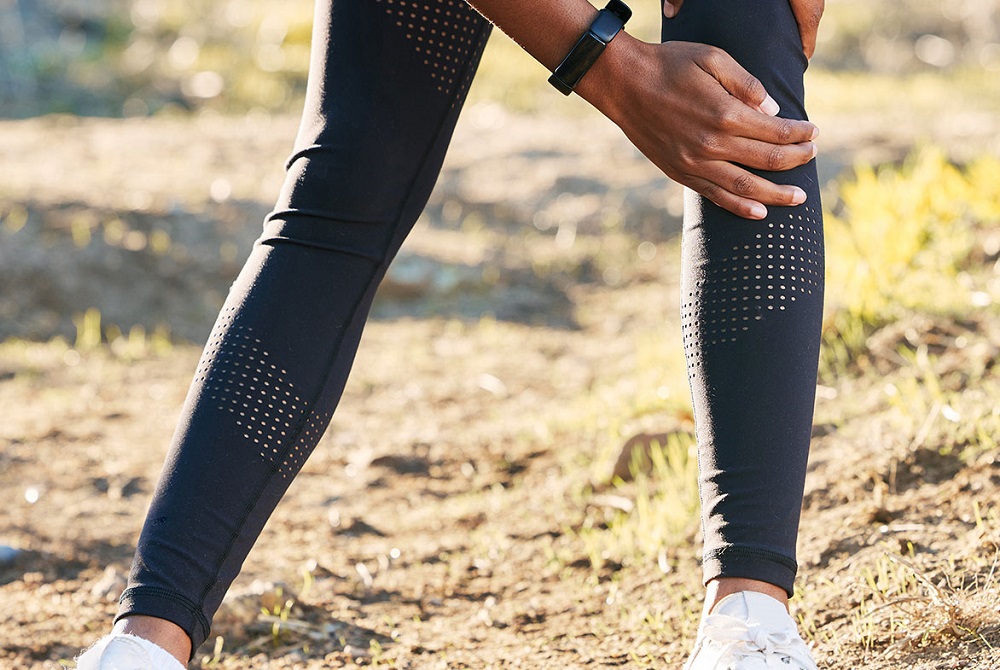
Snap, Crackle & Pop: Why Do My Knees Make Noises - And Should I See a Doctor?
April 5, 2022
Do you ever just go about your daily life and then, seemingly out of nowhere, your knee makes a noise?
You might call it a weird idiosyncrasy and not think twice about it—or you might turn to the Internet to try and find all of the potential issues that might be wrong with your knee.
But if your knee pops or cracks once in a while, it’s usually no cause for concern. After all, joints sometimes make noises, and knees are no exception (especially when you squat or sit down.)
“Infrequent knee pops and cracks are more common in the younger population, says Nancy White, M.D., a sports medicine physician at Henry Ford Health. “When you feel that ‘pop,’ it means your kneecap was pulled a bit outside of where it’s supposed to be, and so it’s correcting itself and getting back into position. You can kind of feel that something moved.”
If, however, pain or swelling accompanies a noisy knee, you should have it evaluated by a sports medicine provider. And if your knee is popping or cracking regularly, that's another sign you should have it checked out.
“If you let it go, your knee could get worse,” says Dr. White. “There are recommendations a doctor can make to prevent this from happening, such as strengthening and flexibility exercises.”
What Is Knee Crepitus?
If your knee sounds like Rice Krispies crackling (or you experience a grinding sensation) it likely means you have knee crepitus, which can signify the beginning of osteoarthritis behind the kneecap.
“Knee crepitus is primarily caused by an issue called patellofemoral dysfunction,” says Dr. White. That sounds like a mouthful, but it means that your knee isn’t tracking straight up and down like it’s supposed to.
“There’s cartilage on the back of your kneecap and on the front part of your thigh, and the cartilage on the front part of your thighbone makes a groove so the kneecap can glide straight up and down in a floating position,” says Dr. White. “If the cartilage is worn down (and inflamed, worn-down cartilage signifies osteoarthritis), the kneecap can’t smoothly glide up and down, causing knee crepitus.”
If you are experiencing knee crepitus, you should see a sports medicine primary care physician, especially if it is accompanied by pain. They can recommend a variety of treatments, such as physical therapy and cortisone injections.
Still not sure if your noisy knees are cause for concern? When in doubt, call your doctor. After all, the sooner your doctor can examine it, the sooner you can prevent an issue from getting worse.
To learn more about your orthopedic condition or to find a provider, visit henryford.com/ortho.
Dr. Nancy White is a sports medicine physician with Henry Ford Health. She sees patients at Henry Ford Medical Center – Novi, and Henry Ford Medical Center – Bloomfield Township.

Health Tip: Game Day Nutrition
September 24, 2019
 By Nick Parkinson, M.Ed., ATC, AT
By Nick Parkinson, M.Ed., ATC, AT
Henry Ford Health System
Parents, you know how important it is for your student athlete to be well-rested, well-fueled and well-hydrated. Just like a car needs gas, their bodies needs food.
So, whether they’re doing an intense workout during practice or competing in a strenuous game, it’s crucial for them to be properly hydrated and nourished, both before and after, so they can perform their best and recover properly.
Pre-Training Nutrition
The most important part of pre-training nutrition is making sure your child’s food choices give them the healthy energy boost they need for the type of physical activity they’re engaged in, and not a just quick sugar rush.
Carbohydrates may have a bad reputation, but they’re actually the body’s main source of energy. Before a workout, a healthy snack is a great idea. The trick is to eat far enough in advance to be able to digest before being active.
To ensure proper digestion while fueling up, follow these tips:
If there’s less than two hours until go time, try a quick snack like a banana, apple, or a small bowl of Greek yogurt with granola and fruit.
Have a little time to spare? You could try a brown rice bowl with sautéed vegetables or a cup of oatmeal topped with fruit.
Either way, carbs will fuel the body so your child can perform at his or her peak.
Post-Training Nutrition
After an intense workout or game, your child’s body is depleted of its nutrients. It needs to be recharged, which means eating carbs, fats and proteins. The word “fats” tends to scare people, but they’re actually a crucial component in building muscle and recovering.
After an event where your athlete worked out hard, encourage your child to eat something that includes multiples food groups. Try something simple like avocado or peanut butter toast, hummus with veggies and whole-wheat pita, or even a smoothie.
Hydration No Matter What
Regardless of the intensity of the workout, the most important thing is to keep your kid hydrated before, during and after.
It is recommended to top off water intake approximately two hours before any physical activity. Then, athletes should continue hydrating throughout. And while there are many sports drinks to choose from, the healthiest option is water. If you want to add some fun (and natural) flavors to them, try infusing with fruits and/or veggies.
Want to learn more? Henry Ford Health System sports medicine experts are treating the whole athlete, in a whole new way. From nutrition to neurology, and from injury prevention to treatment of sports-related conditions, they can give your athlete a unique game plan.
Visit henryford.com/sports or call (313) 972-4216 for an appointment within 24 business hours.

